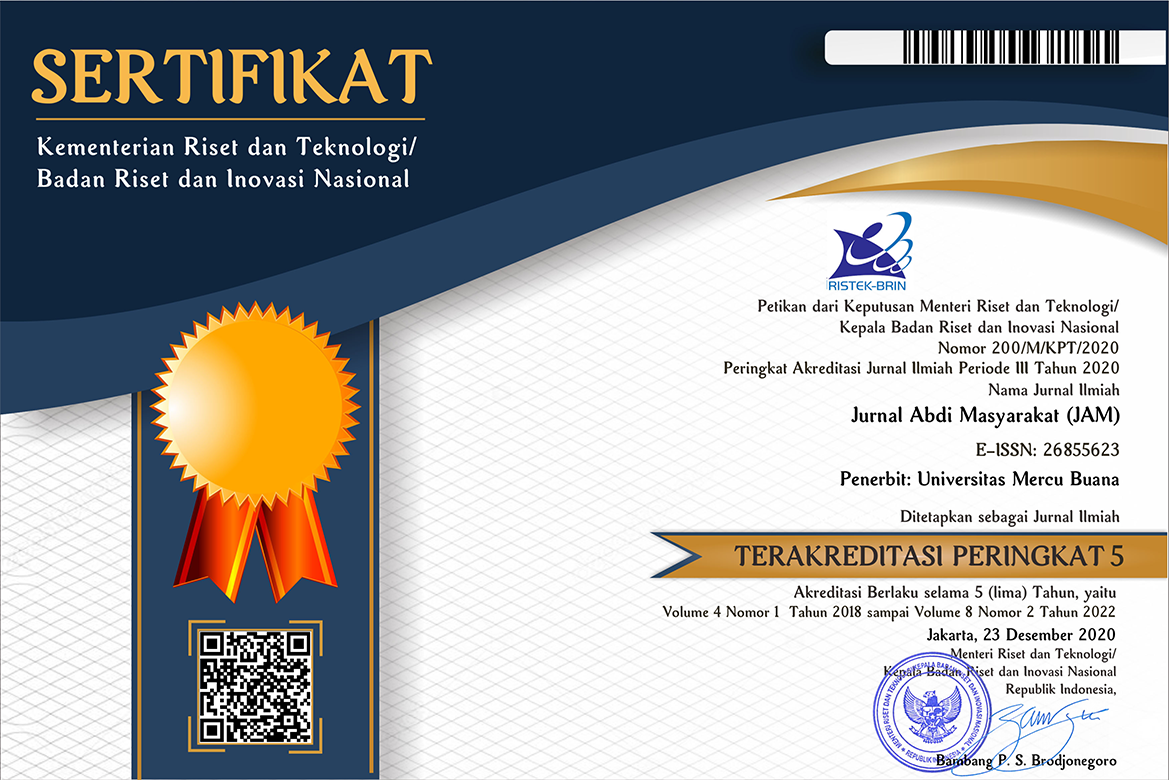Using School Meal Report in improving the performance of school children meal at PAUD Bintang Harapan, Tanjung Morawa, North Sumatera
Abstract
At the age of 0 to 6 year is a period of growth acceleration and development. To achieve growth and development maturation, optimal nutrition is needed (Maisuari, 2022). To meet the optimal nutritional for school children needs better food supplies in school meand or breakfast
In this community service activities, the team designed the school meal report book for scoring the performance of school meal.
The food report book is a communication media between teaches and parents on children school food. This book contains seven item to measures, namely 1) type of foods, 2) type of nutritent, 3) processing, 4) meal serving, 4) consumption, 5) consumption, 6) drinks and 7) meal box
Every day teachers observe meals dan giving scoring. Number of children used meal report book is 60 children from five classes. Each children have one meal report book. The activities of using meal report book is six weeks. Each item of meal performance was scored into three categories; 6, 8 and 10. Example if types of foods only 1 or 2 types such as rice and fish it is scored 6. If 3- 4 types it is scored 8 and if more than 4 types the scoe is 10
After six weeks using the meal report book, there were positive changes in several items of food performance.
Among seven items of food performance, the average score of serving and type of drinks (7.0) are lower than other items. In week 2, five among seven items had low score. Only consumption and meal box had higher scores. This trend of scores also happened in week 3 and week 4. In week 5 and 6, only the score of drinks was low (7.5), while other variable had higher scores; types of foods 7.9, servings 7.9, types of nutrient 7.9 and score for consumption was the highest 9.0.
Introducing meals report can affect the performance of school meals in processing, serving and nutrient contentsKeywords
Full Text:
PDFReferences
REFERENCES
Handriana Gustin .J. (2020). Gambaran pengetahuan dan peran orang tua tentang perilaku konsumsi jananan pada anak sekolah dasar di SD GMIT Manumuti. 4(April), 0–7.
Mochamad Khusnul Yaqin Faridha Nurhayati Abstrak. Pendidikan Olahraga Dan Kesehatan, 2(1), 114–118.
McClelland, D. (2014). Teori Motivasi Berprestasi. 10–28.
Meriska, I., Pramudho, K., & Murwanto, B. (2014). Perilaku Sarapan Pagi Anak Sekolah Dasar. Jurnal Kesehatan, 5(1), 90–97. http://poltekkes-tjk.ac.id/ejurnal/index.php/JK/article/view/72
Maisuari, W. O. A. (2022). Bekal Makanan Kemasan Paud Sebagai Pemicu Perilaku Konsumtif Orang Tua Peserta Didik di TK Nurhikmah. Indonesian Journal of Early Childhood: Jurnal Dunia Anak Usia Dini, 4(1), 134. https://doi.org/10.35473/ijec.v4i1.1293
Putri, A. J. (2018). Hubungan Asupan Protein dengan kemampuan kognitif anak usia sekolah di Madrasah Ibtidaiyah Muhammadiyah Kartasura. Photosynthetica, 2(1), 1–13. http://link.springer.com/10.1007/978-3-319-76887-
Rahma, F. (2016). Hubungan Antara Kebiasaan Sarapan Pagi Dengan Prestasi Belajar Siswa Sdn Sawahan I/340 Surabaya. Kesehatan, v(3), 576–587.
Riskesdas 2018. (2018). HASIL UTAMA RISKESDAS 2018 Kesehatan. 20–21.
Sinaga, H. T. (2018). The effectiveness of applying score system in growth chart to predict stunting and improve nutritional knowledge of pre-schooler’s mothers in Indonesia. Indian Journal of Public Health Research and Development.
Sinaga, H. T., Achmad, N., Alza, Y., & Sitanggang, B. (2021). Improving the performance of children school meal using meal report at kindergarten school in indonesia: A quasi-experimental study. Open Access Macedonian Journal of Medical Sciences, 9(2), 974–979. https://doi.org/10.3889/oamjms.2021.7111
Triwardhani, I. J., Trigartanti, W., Rachmawati, I., & Putra, R. P. (2020). Strategi Guru dalam membangun komunikasi dengan Orang Tua Siswa di Sekolah. Jurnal Kajian Komunikasi, 8(1), 99. https://doi.org/10.24198/jkk.v8i1.23620
Umasugi, F., Wondal, R., & Alhadad, B. (2020). Kajian Pengaruh Pemahaman Orangtua Terhadap Pemenuhan Gizi Anak Melalui Lunch Box (Bekal Makanan). Jurnal Ilmiah Cahaya Paud, 2(1), 1–15. https://doi.org/10.33387/cp.v2i1.1927
Fagerlin, A., Ubel, P.A., Smith, D.M., Zikmun-Fisher, B. J (2007). Making Numbers Matter : Present and Future Research in Risk Communication. American Journal Health Behavior. 2007;31(Suppl 1):847-856.
Susanto, A. 2017. Pendidikan Anak Usia Dini. Konsep dan Teori. Bumi Aksara
Verdiana, Lydia., dkk.(2017). Kebiasaan sarapan berhubungan dengan konsentrasi belajar pada siswa SD negeri Sidoharjo I Malang. Media Gizi Indonesia, Vol. 12, Juni 2017
DOI: http://dx.doi.org/10.22441/jam.v9i1.21622
Refbacks
- There are currently no refbacks.
Copyright (c) 2023 Jurnal Abdi Masyarakat (JAM)

This work is licensed under a Creative Commons Attribution-ShareAlike 4.0 International License.
Indexing by :

|
|

|

|

|

|

|

This work is licensed under a Creative Commons Attribution-ShareAlike 4.0 International License
Jurnal Abdi Masyarakat
Pusat Pengabdian Pada Masyarakat
Jl. Raya Meruya Selatan, Kembangan, Jakarta 11650
Tlp./Fax: +62215871335
p-ISSN: 2460-352X
Online-ISSN: 2686-5623
http://publikasi.mercubuana.ac.id/index.php/jam









